by Neal Maloney.
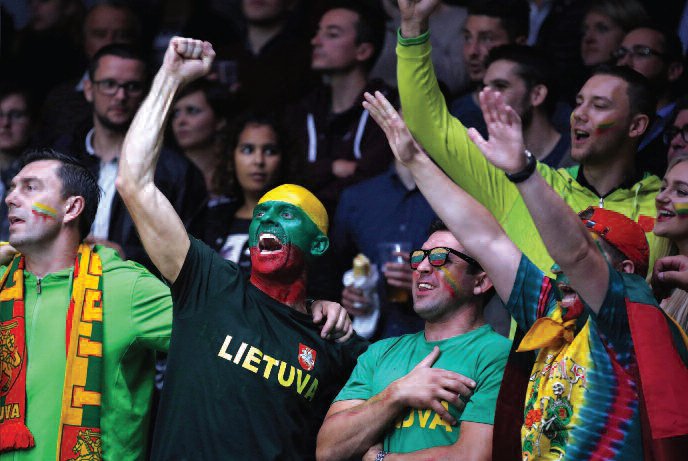
This year Lithuania gave another strong showing at the Eurobasket, bringing home national pride with a silver medal for the second time in a row. At the last Eurobasket in 2013, Lithuania also took the silver medal.
The team this year was a little different than it was back in 2013. Jonas Valančiūnas was not joined in the front court by Donatas Motiejū- nas, his fellow NBA center . D-Mo is struggling with back issues at this time. Paulius Jankūnas, the versatile forward of Žalgiris, Kaunas got the starting nod next to Valančiūnas instead. They were backed up by aging veteran big man Robertas Javtokas and Euro League club player Antanas Kavaliauskas. Despite solid performances in the past couple of tournaments, the Lavrinovičius twins were strangely left off the roster, which didn’t help Lithuania’s three-point shooting. Finally, in his first ever appearance on the national team was young Domantas Sabonis. He is the son of Lithuanian basketball legend Arvydas Sabonis. He played his freshman season of college ball at Gonzaga University last season, where the young Sabonis had a standout year on the court.
In the backcourt, Mantas Kalnietis resumed his role as leader of the team at the point-guard spot after being out almost the whole year of 2014, missing the World Cup tournament. He was joined by his usual backcourt partner Renaldas Seibutis at the shooting guard spot. Lukas Lekavičius, a rookie 21 year old point guard, was given a spot on the team by coach Kazlauskas over Adas Juškevičius, a player who had a very solid performance last year at the World Cup. Juškevičius filled in for the injured Kalnietis at that tournament in Spain. The veteran Simas Jasaitis was also replaced this year in his sharpshooting role off the bench by rookie three-point sniper Artūras Milaknis.
As always for team Lithuania, the middle forward spots were the strongest spots on the team, solidly manned by the tandem of Jonas Mačiulis and Mindaugas Kuzminskas. These guys are both complete players who help the team win every time. They combine size, speed, athleticism and even range shooting along with their experience. They are smart players and great defenders; these two guys are indispensable core players of the team.
Group Play (Group D)
In FIBA basketball, all tournaments are “round robin” format where six teams compete in four separate groups. Each team plays every other team in their group onetime, and then the top four teams with the best records in group play move on to the knockout stage.
In Lithuania’s group D, they faced their Baltic neighbors of Latvia and Estonia, along with Belgium, the Czech Republic and Ukraine. In group play Lithuania went a solid 4-1, dropping only one game on a very controversial, buzzer-beating put-back by Belgium. The only game that wasn’t closely contested was against Latvia, a team they defeated by double-digits. Every other game was a nail-biting thriller, with the reinvigorated Czech national team even taking them to the only overtime game of group play. Lithuania prevailed though in each and every contest by grinding it out like they always do. They always had something left in the tank when their opponents were too exhausted to continue and had given up. They ended up in first place in Group D.
Knockout Stage (Win or Go Home)
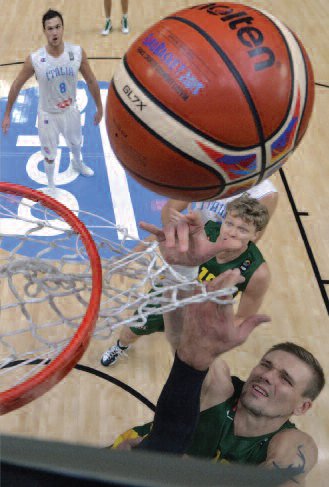
against Italy. (EPA-ELTA)
Georgia
In the first round of the knockout stage (the sweet 16) they faced the weakest team of group C, which happened to be Georgia. Just like the games in group play, this game was also a hard-fought victory for the Green Machine, going right down to the wire. NBA player ZaZa Pachulia led the way for his Georgian team and did a great job shutting Jonas Valančiūnas down to only five points. On team Lithuania’s side, Jonas Mačiulis was the big hero, with an incredible stat line of 34 points, six rebounds, four assists and four steals. When Georgia fought back to within one point late in the game, Mačiulis calmly killed Georgia’s hopes with a dagger of a three pointer, advancing Lithuania to the quarterfinals to play Italy.
Italy
In the quarterfinals Lithuania faced a team packed with four NBA players. This was the first time in recent memory that Italy had the band back together of Bargnani, Gallinari, Belinelli and team captain Luigi Datome. This was by far the strongest Italian team in years. They had not won a medal in international competition since 2004. In this game Jonas Valančiūnas went into “beast mode”, scoring 26 points and grabbing 15 boards. He let it be known to his former Toronto Raptors teammate Andrea Bargnani that he was“the man” in the paint. The Lithuanian defense was the true hero though, getting the key stop they needed at the end of regulation to send the tied game into overtime. In OT, Lithuania went on a final push against the exhausted Italian team, outscoring them 16-6 in the final period and earning LT a spot in the final four.
Serbia
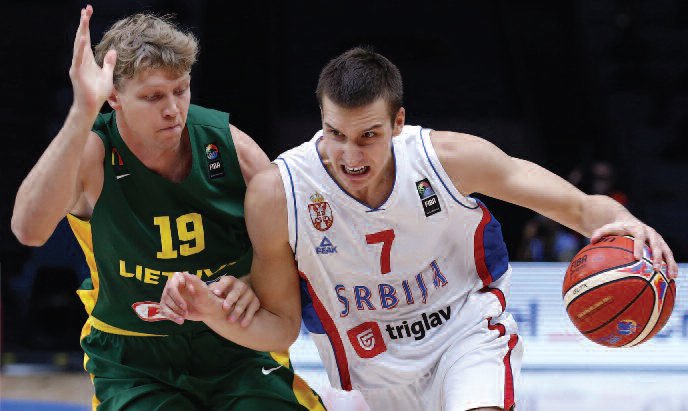
In the semifinal against Serbia, total war was required to get Lithuania past their undefeated opponent. It was a low-scoring slugfest of a game, a battle of two great defensive teams who inhibited most of the offense. Almost every time Lithuania would go on a run and get a little bit of a lead, Serbia would come charging right back. Lithuania had 20 turnovers and shot only 2/14 from three-point range, usually a sign of a losing team. But not in this case! The difference was, they outrebounded the Serbs, which is what counted in the end. On the Lithuanian side there was balanced scoring, not unusual for team-oriented Lithuania. This victory automatically got them a spot at the podium no matter what happened against Spain, earning them the silver medal. It also qualified them for the Olympics in Rio next year.
Final vs. Spain
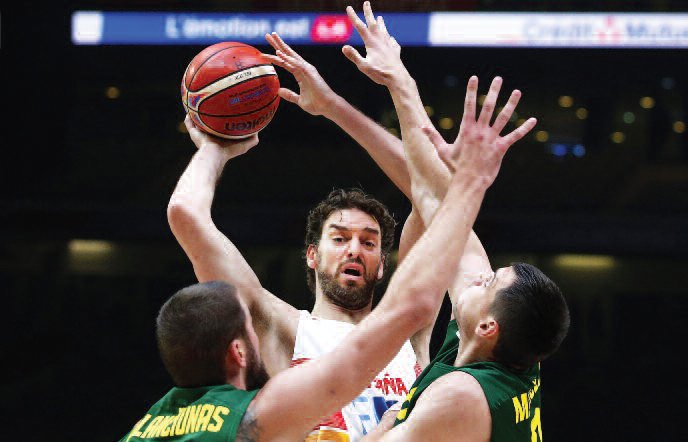
Lithuania is a country of three million people that has been kicked around throughout its recent history. The fact that they’ve now won 11 medals in international competition as an independent country is astounding. Bottom line, Lithuania has earned respect, perhaps the very thing they’ve wanted the most throughout that tumultuous history. In this gold medal game they met a surging Spain. This team had tournament MVP Pau Gasol who went off yet again for another 24 points. Lithuania had spent all their energy making it as far as they had and dropped this one to the Spaniards. Under other circumstances they might have put up a better fight; however, all but one of the games in the tournament were fights to the bitter end, and our team was understandably exhausted.
The Lithuanian Way of Basketball
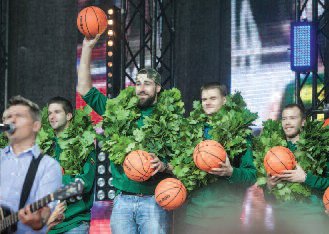
In this tournament despite being down a few key players, Lithuania showed the international basketball world why they’re very much like the highly successful five-time champions, the San Antonio Spurs in the NBA. Instead of being a professional team with an elite system like the Spurs, they are a nation with a great system that works for them. Common sense dictates that you shouldn’t mess with success. Lithuania’s 11 medals in international competition don’t lie; obviously this system works for them. They use it to their advantage, and it really does not matter what specific personnel they have on the court; either you’re part of the elite basketball culture or you are sitting on the bench of Coach Kazlauskas.
Lithuanian Basketball System (5 D’s):
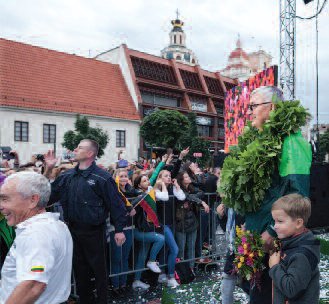
- Discipline
- Defense
- Depth
- Die-hard perseverance
- Damage in the paint
1) Lithuania players play with DISCIPLINE. They will keep passing the ball, shot clock permitting, until they get the best available shot. They have been in big games in international competition before and have the experience to know when to foul and how to goad their opponent into fouling them. They don’t crack under pressure and being down in the score absolutely doesn’t faze them. Coach Kazlauskas has his team set up almost like they’re in the military; everyone knows their role and buys in. He will simply not tolerate whiners, cry-babies or prima donnas.
2) Lithuanian teams are known for their DEFENSE. Either you play defense or you can watch the game from the bench on coach K’s team. They know how to lock you down at the crucial time and get the key stops. Their 6’5” guards are excellent on defense because they’re tall enough that they can switch up on bigger players without having mismatches created, which can kill teams that have small guards. These guards also have length, which is very good for harassing opposing three-point shooters. Players like Jonas Mačiulis are first-team all defense candidates; he led the entire tournament in steals. These players pride themselves on their defense, and they anticipate what the other team will do so they can react quickly and brutally to shut them down. They are one of the top teams in the tournament in opponent FG percentage.
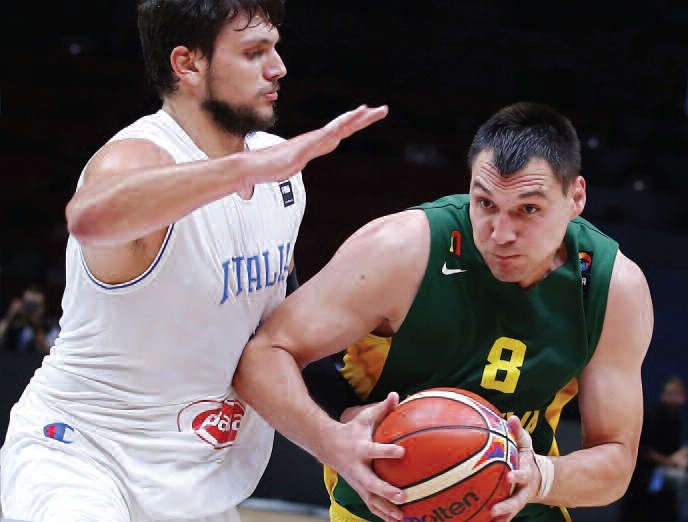
3) They have the DEPTH. Every year Coach K has the extremely difficult task of cutting the team down to the 12-man roster which is required by FIBA tournaments. There are simply so many great choices of players who hold a Lithuanian passport, which is likely the result of being a nation that is obsessed with basketball. As a coach, this glut of eligible players is a problem you want to have. Coach K doesn’t overwork his players; he knows he can keep fresh legs on the floor and suffer a very small drop off in talent level on the court. This keeps the starters on the team fresh for the final push, no small factor in all of Lithuania’s wins in close games. One thing players don’t do on team Lithuania is whine about their minutes. Even an NBA stud like Valančiūnas doesn’t complain when he only gets 25 minutes a game. It’s the way it is on team Lithuania, you’re just part of the team that’s not big on star-players or their egos.
4) DIE-HARD perseverance is the result of having such a deep team that is always able to keep fresh legs on the floor. In doing this, the starters always save a little somethingextra in the tank for the end. In games decided by 5 points or less, Lithuania was 6-1 in this tournament. That definitely says something about their mental toughness. Perhaps it is part of the Lithuanian cultural DNA to never back down to bullies that plays into this. Being an underdog doesn’t bother them one single bit. Their chemistry is superb and the guys love playing with one another; because of this they fight to the end for the sake of each other. Simply put, they are brothers with one another on the court.
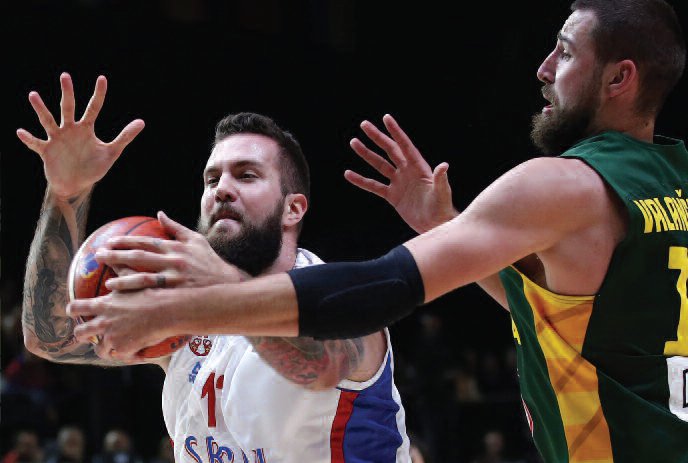
5) They do DAMAGE in the paint. They are constantly looking to get the ball inside to their elite big man, Jonas Valančiūnas. If he gets the ball down low he will either score on you or you will have to foul him to prevent that. It’s that simple. If you clog the paint and try to double-team him, he will kick out to whomever you left open. Part of this paint-centric philosophy includes great rebounding; Lithuania is one of the best around in this category. Quite simply, you get one shot on the offensive end, then the Lithuanians are boxing you out, getting the rebound and then it’s their possession. The bigger guards also are a huge part of this rebounding advantage.
What Needs Work
The main thing for Lithuania that needs work is three-point shooting. Not having the Lavrinovičius brothers and Simas Jasaitis this time around left a gaping hole in their range shooting. Artūras Milaknis definitely helped out starting with the Czech Republic game, since he has the ability to make three-point shots. Aside from him, everyone else on the squad has the ability to make three-pointers but just can’t seem to do so consistently. If they can work out this little issue, they will be even more menacing for opposing teams to play in Rio.
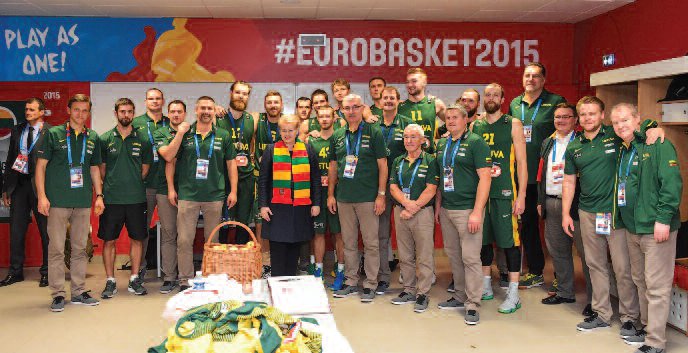
Lithuania also struggles in the backcourt. It is the weakest part of their team. Mantas Kalnietis is great and really bounced back from injury, but he can’t do it alone. He needs help; otherwise he gets really tired and tends to become turnoverprone. If they just had one or two other young guards step up, which they do have on their youth teams, they would be able to correct this problem of backcourt depth. Lukas Lekavičius needs to work on his game because his performance was pitiful in this tournament, eventually losing all his minutes to Milaknis. Perhaps Adas Juškevičius could be a stop-gap measure in Rio; he didn’t shy away from the big stage at the World Cup 2014.
Finally, Donatas Motiejūnas needs to come back healthy. His back injury makes him questionable going forward and the young Domantas Sabonis might not be ready to take over that role by next year. Sabonis showed that he has flashes of brilliance, but still needs to learn the Lithuanian way. Being part of this silver-medal team only helps his development. Unfortunately the best days of Robertas Javtokas are behind him; he won’t be much of a factor on the team except in the locker room where his experience and leadership are valuable. Antanas Kaviliauskas is a decent player, just not really that dominant in any one category to justify a roster spot in Rio. If D-Mo and JV can ever team up again like we had envisioned after the Eurobasket 2013, look out basketball world. That’s one hell of a front court!
All in all it was a very successful tournament for team Lithuania. They accomplished some major goals in getting a silver medal, making it to the Olympics, and getting new guys like Sabonis, Milaknis and others acclimated to the team. The veteran core of team Lithuania are all hitting their peak in the next couple of years. Their peak is right around their late 20’s and early 30’s, a time of dangerous confluence (for their opponents) when their physical and mental prowesses meld together. These next few years will be Lithuania’s time.
The guys on the national team have definitely earned a pat on the back and a long rest. The Lithuanian nation of three million people plus the million or so Lithuanian expatriates in the diaspora owe them a big debt of gratitude for sacrificing their time and their bodies for their country, and for playing their hearts out for the very honorable silver medal. We can’t wait for Rio…
 DRAUGAS NEWS Lithuanian World Wide News in English
DRAUGAS NEWS Lithuanian World Wide News in English
